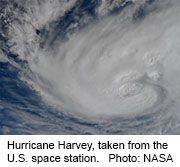- Could Your Grocery Store Meat Be Causing Recurring UTIs?
- Are You Making This Expensive Thermostat Error This Winter?
- Recognizing the Signs of Hypothyroidism
- 10 Strategies to Overcome Insomnia
- Could Artificial Sweeteners Be Aging the Brain Faster?
- Techniques for Soothing Your Nervous System
- Does the Water in Your House Smell Funny? Here’s Why
- Can a Daily Dose of Apple Cider Vinegar Actually Aid Weight Loss?
- 6 Health Beverages That Can Actually Spike Your Blood Sugar
- Treatment Options for Social Anxiety Disorder
Warming Oceans Could Breed More Damaging Hurricanes

Warming oceans could trigger a huge surge in financial losses from hurricanes, new U.S. research contends.
Based on worst-case warming scenarios, scientists estimated the effects that rising ocean temperatures would have on hurricane-related economic losses in 13 coastal counties in South Carolina, including the densely populated city of Charleston.
The researchers said they found that higher ocean temperatures will not increase the frequency of hurricanes, but they will lead to larger, more intense storms that affect wider areas.
“The study shows that a significant increase in damage and loss is likely to occur in coastal Carolina and, by implication, other coastal communities, as a result of climate change,” said study co-author David Rosowky, provost at the University of Vermont.
“To be prepared, we need to build, design, zone, renovate and retrofit structures in vulnerable communities to accommodate that future,” he added in a university news release.
For the study, the scientists calculated the costs associated with hurricane damage in coastal South Carolina under two different scenarios: if ocean temperatures remain unchanged through 2100 and if ocean temperatures rise under a worst-case prediction by the Intergovernmental Panel on Climate Change. The panel is the United Nation-sponsored group that assesses climate change research.
The study team analyzed hurricane data collected over the past 150 years by the National Oceanic and Atmospheric Administration and used estimates from the Federal Emergency Management Agency on property repair and replacement, as well as loss of income.
If the scenario stayed unchanged, the researchers said, expected hurricane-related losses in the region would total $7 billion. But the researchers said there is only a 2 percent chance that this scenario would occur.
Under the warming scenarios, the study found the intensity of hurricanes would be greater and result in losses of $12 billion. These estimates are based only on wind and wind-driven rain and do not include losses due to storm surge or flooding, the researchers said.
The study authors said the three catastrophic storms of the 2017 hurricane season — Harvey, Irma and Maria — may cause a shift in attitudes about the likelihood that severe hurricanes will occur in the future.
“That suggests that these scenarios are evolving,” said Rosowky. “What is today’s worst-case scenario will likely become more probable … if little action is taken to slow the effects of climate change.”
The study was published recently in the journal Sustainable and Resilient Infrastructure.
More information
The U.S. Environmental Protection Agency provides more information on climate change and the weather.
Source: HealthDay
Copyright © 2026 HealthDay. All rights reserved.










